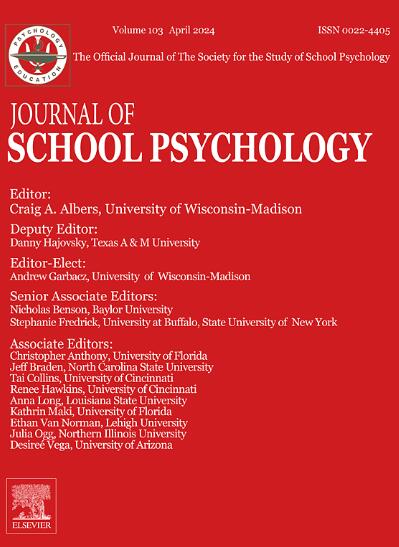教师使用惩戒措施与小学生攻击行为的相互关联
IF 4.1
1区 心理学
Q1 PSYCHOLOGY, SOCIAL
引用次数: 0
摘要
人类发展的交易理论认为,教师的惩戒行为和学生的攻击行为之间的联系可能是相互的。然而,还没有研究证实这种可能性。因此,本研究探讨了教师使用纪律实践(教育和惩罚)与小学生攻击行为之间的互惠关系。样本包括1038名学生(62%为男孩),在幼儿园学年开始和结束时以及每年从一年级到四年级进行评估。在每次评估中,教师报告他们对每个参与的学生进行纪律处分的频率,并完成对这些学生的攻击行为的测量。结构化残差潜曲线模型(LCM-SR)结果显示,教师报告的幼儿园学生秋季攻击行为高于平时水平,预示着教师报告的春季惩罚行为高于平时水平。此外,幼儿园教师在春季的惩罚行为水平高于平时,预示着一年级学生的攻击行为水平高于平时。在接下来的几年里,没有发现惩罚行为和侵略行为之间的其他相互影响。此外,使用教育纪律的做法并没有导致攻击性的减少。研究结果强调,教师需要掌握管理破坏性课堂行为的技能,尤其是在幼儿园和向一年级过渡期间,以防止攻击性行为螺旋式下降。本文章由计算机程序翻译,如有差异,请以英文原文为准。
Reciprocal associations between teachers' use of disciplinary practices and aggression in elementary school students
Transactional theories of human development suggest that the association between teachers' disciplinary practices and students' aggressive behavior may be reciprocal. However, no study has tested this possibility. Therefore, this study examines reciprocal associations between teachers' use of disciplinary practices (educational and punitive) and aggressive behaviors in elementary school students. A sample comprising 1038 students (62 % boys) was assessed at the start and end of the kindergarten year and annually from grades one to four. At each assessment, teachers reported how frequently they used disciplinary practices with each participating student and completed a measure of the aggressive behaviors of these students. Results of a latent curve model with structured residuals (LCM-SR) revealed that higher-than-usual levels of teacher-reported kindergarten students' aggressive behaviors in the fall predicted higher-than-usual levels of teacher-reported punitive practices in the spring. Moreover, higher-than-usual levels of kindergarten teachers' punitive practices in the spring predicted higher-than-usual levels of students' aggressive behaviors in grade one. In the following years, no other reciprocal influences were found between punitive practices and aggression. Moreover, using educational disciplinary practices did not lead to a decrease in aggression. The results underscore the need to equip teachers with the skills to manage disruptive classroom behaviors, particularly in kindergarten and during the transition to grade one, to prevent aggressive behaviors from spiraling downward.
求助全文
通过发布文献求助,成功后即可免费获取论文全文。
去求助
来源期刊

Journal of School Psychology
PSYCHOLOGY, EDUCATIONAL-
CiteScore
6.70
自引率
8.00%
发文量
71
期刊介绍:
The Journal of School Psychology publishes original empirical articles and critical reviews of the literature on research and practices relevant to psychological and behavioral processes in school settings. JSP presents research on intervention mechanisms and approaches; schooling effects on the development of social, cognitive, mental-health, and achievement-related outcomes; assessment; and consultation. Submissions from a variety of disciplines are encouraged. All manuscripts are read by the Editor and one or more editorial consultants with the intent of providing appropriate and constructive written reviews.
 求助内容:
求助内容: 应助结果提醒方式:
应助结果提醒方式:


